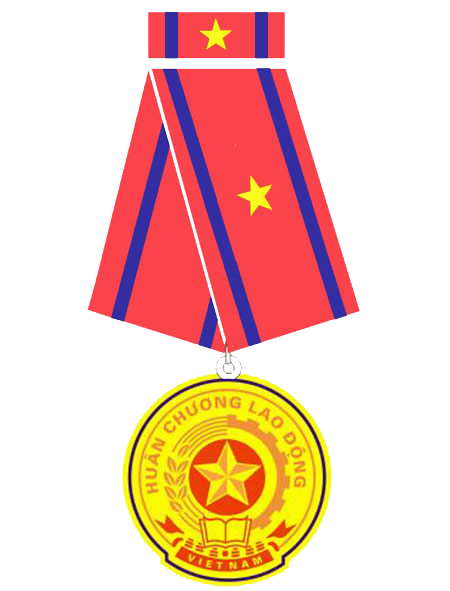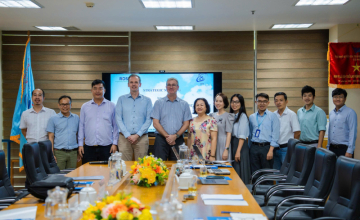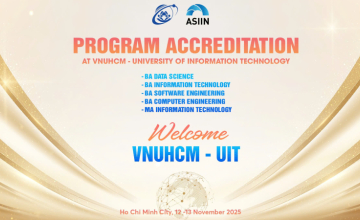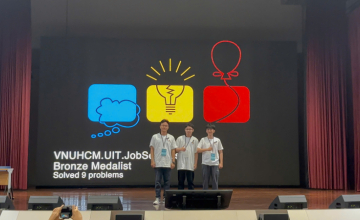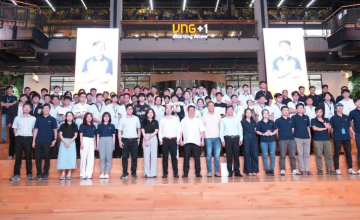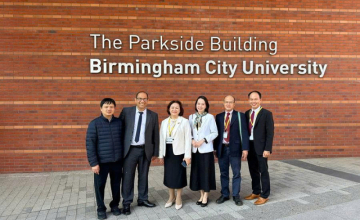Chips integrated into cameras to measure vehicle speed, chips in brainwave measurement devices supporting sleep... are ideas proposed by students participating in the Ho Chi Minh City Chip Design Competition.
On the morning of March 24, the Ho Chi Minh City High-Tech Park in coordination with the Youth Union organized the first round of the Chip Design Competition for smart cities with the participation of 29 project teams of young people aged 18 - 23.
A group of students from University of Information Technologybrought to the competition the idea of designing a chip to measure the speed of moving vehicles in traffic. According to team leader Phan Hoai Lam, the chip is integrated into traditional cameras, with a mechanism for analyzing images collected by measuring the distance between two points on the frame and the time it takes to move between two points to determine the vehicle speed. This technology can process the speed of multiple vehicles simultaneously with an initial expected accuracy of about 60%, which will increase with image processing optimization.
The team is building the chip design architecture model and requires specialized tools and software to complete it. Hoai Lam stated that the team's technology allows data to be processed directly at the camera faster, saving bandwidth costs, and reducing data transmission to the server. In the future, the team will integrate mechanisms to identify license plates, vehicle colors, etc.

Chip design application for health care, a group of students from University of Technology created a device worn on the body to help improve sleep quality through brainwave frequency. The device operates by measuring human brain electrical activity, processing the information, and then emitting appropriate sound frequencies to support maintaining sleep.
Nguyen Xuan Trieu, the team representative, stated that the product can be integrated into pillows, neck straps, headphones, etc., with the smallest possible size to ensure comfort during use. "The product is still in the idea stage, so determining the appropriate device for integration requires time and advice from medical research experts," Trieu said.
With the same idea of health care, a group of students from the University of Commerce, Ho Chi Minh City University of Economics, raised the issue of creating integrated circuits with sensors combined with AI algorithms to identify people who fall. The product can be designed as a bracelet, necklace, etc., with the function of immediately alerting relatives via their mobile phones when elderly people or people with strokes fall. The team is in the process of designing circuit architecture and building a team to perfect the idea and create the product.
Through expert assessments, from 29 projects, the Organizing Committee plans to select 10 profiles to participate in the training round to support students in product development. Deputy Head of the Management Board of the Ho Chi Minh City High-Tech Park Le Quoc Cuong stated that through the competition, they aim to find ideas about semiconductor chips from young people. This is an important premise to expand the scale and quality of training human resources according to business needs, aiming to possess core technologies, incubate chip companies, and attract strategic investment projects in the field to operate in the Ho Chi Minh City High-Tech Park.

From the business perspective, Tran Dac Khoa, General Director of Renesas Vietnam Design Company, believes that students participating in seminars and academic competitions in this field are one of the six necessary skills for chip engineers. This helps students have the opportunity to learn in a larger environment because the semiconductor industry is constantly evolving each year. Competitions help students enhance teamwork skills because individuals cannot easily create products.
According to Ha An - VNExpress Newspaper
For more details, visit: https://vnexpress.net/sinh-vien-thiet-ke-chip-do-toc-do-xe-song-nao-4726006.html?fbclid=IwAR3PsgqYaF9PyfJsndEMjL_1_VVcjOsapDCVu18AVbYG2riLAEHokM6_V1k
Ha Bang - Media Collaborator, University of Information Technology
Nhat Hien - Translation Collaborator, University of Information Technology

